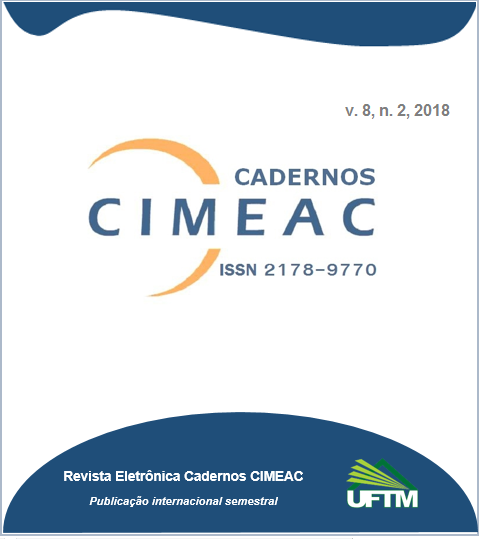Educação do campo e o trabalho socialmente útil: uma prática pedagógica em estágio supervisionado / Countryside education and socially useful work...
DOI:
https://doi.org/10.18554/cimeac.v8i2.2863Abstract
Este artigo apresenta, à luz da Educação do Campo, uma prática pedagógica vivenciada em uma escola urbana, lotada no município de Dom Pedrito/RS, que recebe alunos oriundos do campo. Tem-se por objetivo descrever um experimento pedagógico realizado durante o Estágio Supervisionado Obrigatório nos anos finais do Ensino Fundamental, que teve como suporte o planejamento por Complexo de Estudo (CALDART; FREITAS; SAPELLI, 2015). Trata-se da prática docente em uma perspectiva social, inclusiva e participativa, fazendo uso da ferramenta “Inventário da Realidade Social”. De acordo com os dados coletados e análise dos mesmos, foi possível destacar elementos balizadores para a elaboração do complexo de estudo, que procurou abranger a grande totalidade da comunidade escolar e comunidades rurais atendidas pela referida escola. O experimento pedagógico teve como tema principal o trabalho socialmente útil, o qual deu origem ao projeto “Aluno Integrado” que oportunizou a estudantes rurais e urbanos o convívio participativo e atuante na escola, contribuindo com o processo formativo nos âmbitos pedagógico e social. Assim, esta experiência evidenciou fatores relevantes entre a dicotomia rural e urbana, apresentando a escola como espaço gerador na construção dos múltiplos saberes. Buscou-se, para além do conhecimento cognitivo, a valorização do contexto social em que o aluno está inserido. Como resultado, foi possível à comunidade escolar experienciar um olhar amplo à perspectiva educacional, percebendo o aluno como um todo, dando a devida importância à sua presença nesta escola.
Palavras-chave: Complexo de estudo; Educação do campo; Trabalho socialmente útil.
ABSTRACT: This article presents, it up the Coutryside Education, a pedagogical practice experienced in a crowded school urban in the municipality of Dom Pedrito / RS, which receives students from the countryside. The objective is to report and present a pedagogical experiment carried out during the Mandatory Supervised Internship in the last years of Elementary Education, which was supported by the Complex Study Plan (CALDART; FREITAS; SAPELLI, 2015). It is the teaching practice in a social, inclusive and participatory perspective, making use Social Reality Inventory tool. According to the data collected and the analysis of these, it was possible to highlight elements for the elaboration of the study complex, which sought to cover the great totality of the school community and rural communities served by refered school. The pedagogical experiment had as its main theme the socially useful work, this gave rise to the project "Integrated Student" that gave rural and urban students the participative and active living in the school, contributing to the pedagogical and social formative process of them. Thus, this pedagogical experience evidenced relevant factors between the rural and urban dichotomy, presenting the school as generating space in the construction of multiple knowledge. It was noticed that this one contemplated not only the cognitive knowledge but also the social context in which the student is inserted, allowed the school community a broad view in the educational perspective valuing the student as a whole, giving due importance to their presence in this school.
Keywords: Study complex; Coutryside education; Socially useful work.
Downloads
Published
Issue
Section
License
Os autores que publicam nesta revista concordam com os seguintes termos:
(a) Não cobramos dos autores para a publicação neste periódico.
(b) Autores mantém os direitos autorais e concedem à revista o direito de primeira publicação, com o trabalho simultaneamente licenciado sob a Licença Creative Commons que permite o compartilhamento do trabalho com reconhecimento da autoria e publicação inicial nesta revista.
(c) Autores têm permissão e são estimulados a difundir e a distribuir a versão publicada de seu trabalho online (ex.: em repositórios institucionais ou na sua página pessoal) após o processo editorial, já que isso pode aumentar o impacto e a citação do trabalho publicado (Veja O Efeito do Acesso Livre).
* * *
AUTHORS COPYRIGHT AND PUBLISHING RIGHTS
Authors who publish with this journal agree to the following terms:
(a) This journal does not charge authors for publication.
(b) Authors retain copyright and grant the journal right of first publication with the work simultaneously licensed under a Creative Commons Attribution License that allows others to share the work with an acknowledgement of the work's authorship and initial publication in this journal.
(c) For authors whose articles have been accepted: authors are permitted and encouraged to post their work online (e.g., in institutional repositories or on their website) after the publication of the text in Cadernos CIMEAC, as it can lead to productive exchanges as well as earlier and greater citation of published work (See The Effect of Open Access).

 10.18554/cimeac
10.18554/cimeac

